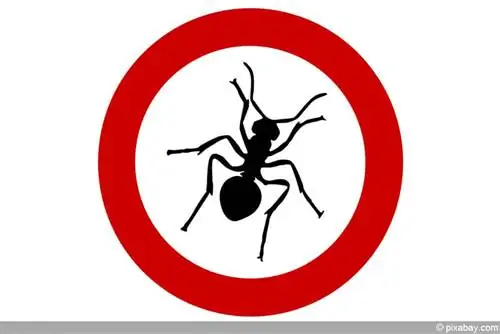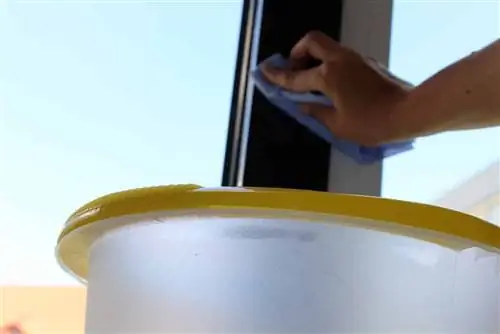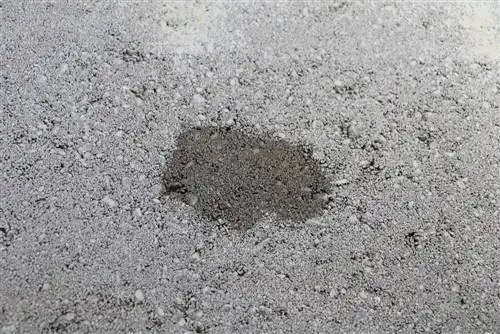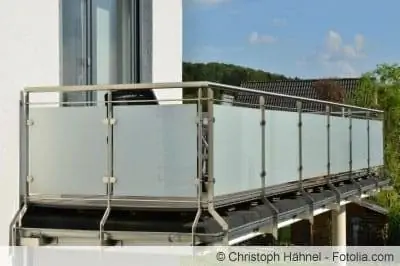- Author admin caroline@plants-knowledge.com.
- Public 2023-12-17 03:39.
- Last modified 2025-06-01 06:48.
It is not necessarily recommended to use a high-pressure cleaner for this because the dirt blaster from the high-pressure cleaner can cause more damage than you would like. In this way, either the sand will be washed out between the plates or the pressure will even attack the surface of the stones. It is better to use tried and tested home remedies. You can find out which home remedies you can use to properly clean your terrace and more helpful tips in this article.
Why should you avoid chemical cleaning products?
There are now numerous chemical cleaning products, but not all of them are environmentally friendly or approved. Plant protection products or pesticides are generally prohibited on paved areas because they endanger and destroy the habitats of organisms. Although some chemical agents have been approved for cleaning patio tiles, they are not really environmentally friendly. In addition, these chemicals cannot achieve a satisfactory effect in terms of permanent moss destruction.
Which home remedies are effective?
There are some effective home remedies that you can use to thoroughly clean your patio and that are harmless to the environment. In principle, it depends on what material your terrace is made of and what type of stains or weeds need to be removed. Some effective home remedies are listed below:
- The best way to remove rust stains is with hot water and a little lemon juice.
- If you have slight signs of greening, you should try citric acid and vinegar, but it doesn't work in the long term and the right dosage is crucial.
- The classic and most environmentally friendly method is cleaning with a broom, mop and brush.
- However, this variant requires muscle strength and endurance.
- Wooden terraces should only be cleaned with warm water and a mild detergent and then oiled. For grooved wood panels, it is better to use a brush. There are now also special cleaning machines that can be rented and are gentle on your wood.
How to properly clean your terrace
In the following, the mixture of water, soda or dishwashing liquid, a tried and tested household remedy, serves as an example to show how you can thoroughly clean your terrace using simple means. Because this mixture ensures a clean terrace in a gentle and environmentally friendly manner. In particular, light dirt caused by the effects of the weather can be removed in this way in a cost-effective and environmentally friendly way. For this you need:
- Scrubber
- Broom
- Bucket with water
- Soda or dishwashing liquid
- First fill the bucket with a little water, mix it with soda or dishwashing liquid and place it outside on your terrace.
- Before applying the mixture to the panels, sweep the terrace thoroughly.
- Now let the mixture work for at least two or three hours.
- Then remove all cleaning residue with plenty of water and a scrubber.
Which substances should you avoid?
Caution should be exercised when using vinegar or lemon juice. If you use too much of these products to remove greenery from your balcony slabs, the acid can do more harm than good. Discoloration and brown spots quickly occur, especially with slabs made of marble, natural stone, lime or ceramic. The acid can also help dissolve the lime from the grout.
Iron sulfate is also not recommended for combating moss on the terrace slabs because the slabs can become discolored and brown spots remain in the places where the moss was.
Especially if your terrace is made of wood, you should not remove the moss chemically. Wood is very sensitive and stains can often form. It is important that wood can breathe, so you should not seal it. It is also a misconception that sealed surfaces are protected from new moss formation, because there is no permanent remedy. However, you can minimize the risk of your patio slabs turning green in advance by choosing the right stones, such as granite, which has a higher silica content. It is also an advantage to install a slope when laying the panels so that the water does not remain on them for long.
More tips for cleaning your patio
Even during the spring and summer months, you should not neglect your terrace and clean it regularly. Especially in spring, weeds quickly grow in the cracks of the terrace slabs, which can be easily removed with the help of a joint scraper. Another effective way to permanently rid larger areas of weeds is to flame with gas or infrared, which should be carried out by a professional. At first the heat stimulates germ formation, but after several more times, you will soon no longer have a problem with the infestation.
Cleaning terraces with concrete paving
Concrete paving is a fairly inexpensive way to pave the terrace and also driveways, carports, paths and the like.
This plaster is also quite easy to care for. However, over time, plants settle in the joints, such as moss, grass and even small flowers, whose seeds are carried by the wind. Ants also like to create their paths between the joints and build their nests underneath. Moss can make the pavement quite slippery when it rains and it also doesn't look very nice. The concrete pavement needs to be cleaned. There are several options.
Cleaning with a high-pressure cleaner
Many homeowners today have a high-pressure cleaner in their inventory. There are special nozzles for these devices to clean concrete pavement. Otherwise you can simply use the widest of the available nozzles.
- The pavement and the gaps where most of the dirt and rubbish is located are hosed down until everything looks clean again.
- The entire area is swept afterwards. It is important to sweep new joint material into the gaps. Simple sand or bas alt sand is usually used for this.
Cleaning with soda
You can get soda in every drugstore. Boil 10 liters of water and add 100 grams of soda. It is important to use a sturdy bucket or other container that can handle the boiling water.
- The whole thing needs to be stirred well.
- Pour the solution immediately over the paving stones.
- Distribute the water with a broom or squeegee.
- All paving stones must be treated this way.
- The product should work for at least 5 hours.
After one to two days, the paving stones are clean and free of moss and algae. Remaining weeds and moss can be swept away with a dry broom.
Cleaning with acetic acid or copper sulfate
Cleaning with a high-pressure cleaner roughens the surface of the concrete. This makes it even easier for mosses and other plants to establish themselves.
- These contaminants can be removed using conventional acetic acid or copper sulfate.
- Scrub the concrete paving stones with a hard scrubber and the cleaning agents and let the liquid work properly.
- Either you let the next rain wash away the product or you do it yourself after a day or two with the water hose.
Alternative - sealing concrete paving
There are special products in the hardware store that can be used to seal the surface. This should help in the long term against the establishment of moss and other weeds. However, it is expensive: you have to expect 400 euros for 200 m². Nano products are even more expensive and only last about 3 years. You should keep in mind that sealed concrete blocks hardly absorb any water. It has to be able to drain!
The most environmentally friendly way is still to remove the impurities with hot water and a brush. If you don't have too much space, this is usually not a problem. A high-pressure cleaner is great for large areas, but it also promotes moss growth by roughening the surface of the stones. There is probably no ultimate remedy.
Conclusion
Regular cleaning of the terrace is the only solution to heavy dirt. To do this, you can use tried-and-tested home remedies, such as a mixture of water and soda or dishwashing liquid to remove winter dirt. In this way, you not only protect the environment, but also your wallet. You will also make a significant contribution to the longer lifespan of your patio tiles if you use tried and tested home remedies instead of using chemical agents that can attack the substance of the tiles.






